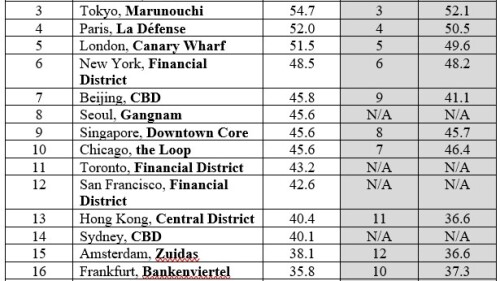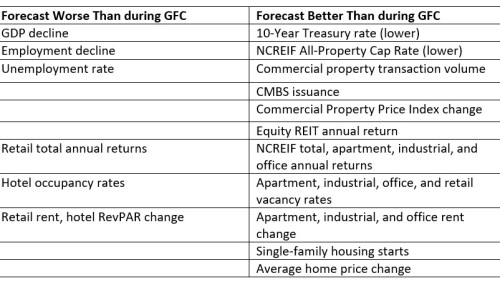Economic Development
Four internationally renowned real estate industry leaders have joined ULI’s Global Board of Directors, and 38 additional industry luminaries have been added to the roster of the Institute’s Global Governing Trustees. Both the Global Board members and Global Governing Trustees will serve on a voluntary basis beginning on July 1.
An international study assesses and compares 21 leading global business districts, confirming that business districts in western Europe and North America continue to lead the way amid fierce competition from Asian business districts, but all will need to adapt for the future in response to the COVID-19 crisis. Business districts in Tokyo, Seoul, Singapore, and Beijing all ranked in the top 10 in this year’s study.
According to survey data from the latest ULI Real Estate Economic Forecast, the current economic recession will be short-lived in the United States, with above-average gross domestic product growth returning in 2021 and 2022. Second, the impact on real estate market conditions and values will be relatively modest and much less severe than the impact experienced during the global financial crisis, with some exceptions by sector.
Innovations in medicine and trends in health care delivery are affecting the design and development of health-related facilities, services, and amenities in Arizona, panelists said during the “The Future of Healthcare and Biotechnology” session at the 2020 ULI Arizona Trends Day.
A retail developer and ULI longtime leader shares how his firm is approaching the current shutdown in the United States and beyond.
Panelists at the 2020 ULI Tampa Trends event said that smart parking and traffic sensors are already being incorporated into large projects, and Microsoft is funding the use of artificial intelligence at the University of South Florida’s medical school.
ULI and Hines have announced a new competition for graduate real estate students across Europe, expanding on its successful 18-year competition partnership in the Americas. The new ULI Hines Student Competition – Europe will see teams of four students from pan-European universities working on a case study that tests their understanding of real estate finance, investment, and development, as well as social and environmental issues, to present a solution for a timely land use challenge.
The talk about futuristic transportation has been exciting, but reality may be more expensive—and farther off—than imagined.
A nervous system capable of collecting data and a brain that is able to make use of it are vital to a system that meets the needs of stakeholders—and society.
The winners, each of which demonstrates a comprehensive level of quality and a forward-looking approach to development and design, include seven projects in the United States, three in Asia, and one in Europe.








